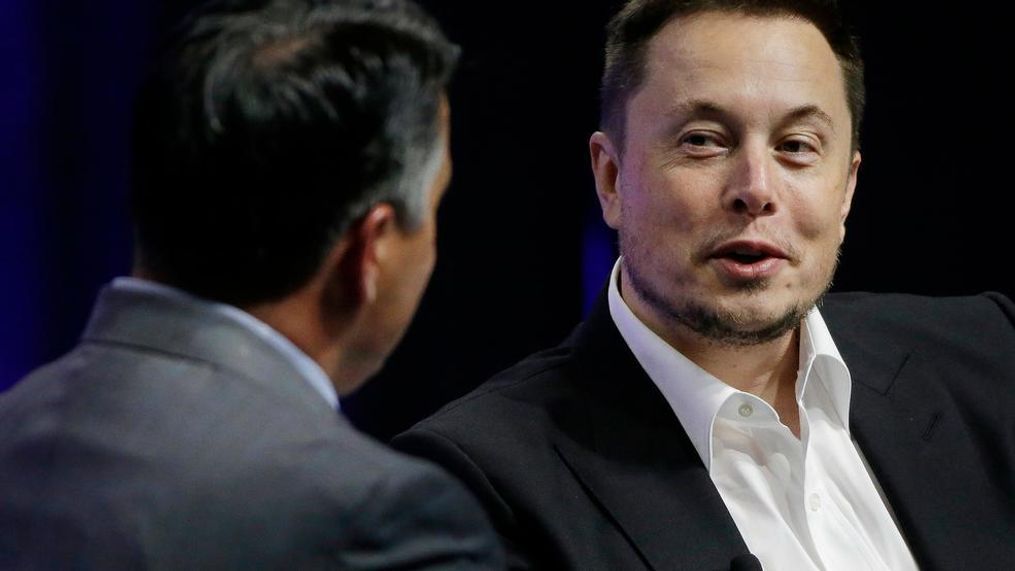Tesla proposes big payout if Musk meets lofty goals

Elon Musk is known for his bold predictions on electric and self-driving cars. Now his pay could depend on whether those predictions come true.
Under a new all-or-nothing pay package, Musk would remain at Tesla Inc. for the next decade and see his compensation tied to ambitious growth targets.
The proposal, revealed Tuesday in a regulatory filing, requires that Tesla grow in $50 billion leaps, to a staggering $650 billion market capitalization.
The electric car maker, based in Palo Alto, California, is worth less than $60 billion today. Tesla must hit a series of escalating revenue and adjusted profit targets, only after which Musk would vest stock options worth 1 percent of company shares. He would get no other guaranteed compensation.
The pay package, developed over the last six months by Tesla's board, still needs the approval of Tesla shareholders, who will vote on it at a special meeting in late March. Musk and his brother Kimbal, who is a Tesla board member, will recuse themselves from the vote.
If the goals are reached, Tesla would be one of the biggest companies in America. The $650 billion benchmark would make Tesla the fourth-most valuable U.S. company, behind only Apple Inc., Alphabet Inc., and Amazon.com Inc. based on current valuations. It would be larger than Microsoft Corp., and would exceed the current combined valuation of the world's top eight publicly-traded auto companies.
The pay scheme would also catapult Musk into the ranks of the world's richest people. Musk's stock options could be worth up to $55.8 billion if he meets the company's goals. He also would own a 28 percent stake in Tesla, which would be worth $182 billion. Forbes' current richest billionaire, Microsoft co-founder Bill Gates, is worth $86 billion.
Musk has long had ambitious plans for Tesla. In a 2015 earnings call with analysts and media, he predicted Tesla could match Apple in total value by 2025.
Musk's growth plans were laid out in a 2016 blog post he titled "Master Plan, Part Deux." Tesla plans to expand from electric cars and SUVs to trucks — including a semi due out in 2019 — and buses. It will continue to work on autonomous vehicle technology and plans to enter the car-sharing business, letting Tesla owners share their cars when they're not using them and running Tesla-owned fleets in cities.
The company, which bought solar panel maker SolarCity Corp. in 2016, also plans to expand its solar panel and energy storage businesses. Tesla is making solar panels and roof tiles at its factory in Buffalo, New York, which will help the company blunt any impact from President Donald Trump's recent 30-percent tariff on imported solar panels and cell modules.
The plans are ambitious, but that's nothing new for Tesla. Under a 2012 agreement, Musk's stock options vested only if the Tesla's market cap continued to rise in $4 billion increments. The company also had to hit matching operational milestones, including vehicle production targets and developmental milestones tied to the Model X and Model 3 programs. Tesla wound up reaching all of the market cap milestones and nine of the 10 operational milestones, falling short only of its goal to have four consecutive quarters with 30-percent gross margins.
When that pay package was created, the company was worth just $3.2 billion. Its market cap at the end of last year was 17 times that amount. That's why the new goals may not be that far-fetched, says Michael Ramsey, an analyst with Gartner who follows Tesla.
"To this point, it has been dangerous to predict failure for Tesla or Elon," he said.
Adam Jonas, an analyst with Morgan Stanley who follows Tesla, thinks plan is partly a marketing tool as the competition for electric and autonomous vehicle talent heats up.
Jonas added that Musk — who owns 21.9 percent of Tesla shares — is already "all-in" on the company, so he sees the incentive package as more for investor confidence than for Musk's personal benefit.
In order to vest shares when milestones are reached, Musk must stay on as CEO or serve as both executive chairman and chief product officer. That would give Tesla the option of hiring a different CEO. Tesla said while it doesn't currently intend for Musk to step away from the CEO role, the terms allow him to potentially focus his attention on key products and strategy.
The amount of time Musk divides between Tesla and other ventures has been a concern for investors. Musk is also the founder and CEO of rocket maker SpaceX and the co-founder and chairman of OpenAI, a nonprofit that researches artificial intelligence. He also recently started The Boring Co., which hopes to build tunnels beneath Los Angeles and other major cities for high-speed transit.
Musk has never made a salary at Tesla, which is unusual but not unheard of for a CEO. Ford Motor Co. Executive Chairman Bill Ford didn't take a salary or bonus for five years starting in 2005 when the company's fortunes were sagging. Oracle Corp.'s Larry Ellison has a $1 salary but takes home millions in stock awards. And Steve Jobs took home $1 per year when he was Apple's CEO from 1997 to 2011.
Tesla — which turns 15 this year — has never earned a full-year profit. It has reported only two profitable quarters since it went public in 2010.
Each of the four vehicles it has made has faced significant delays and production problems. Its newest vehicle, the lower-cost Model 3 sedan, is no exception. Musk initially said Tesla would be making 20,000 Model 3s per month by the end of 2017, but he recently pushed that goal to the end of the second quarter.
That hasn't dimmed investors' appetite for Tesla's stock. Tesla shares were up less than 1 percent to $352 in afternoon trading. They've risen around 40 percent over the last year.
___
Durbin reported from Detroit.
